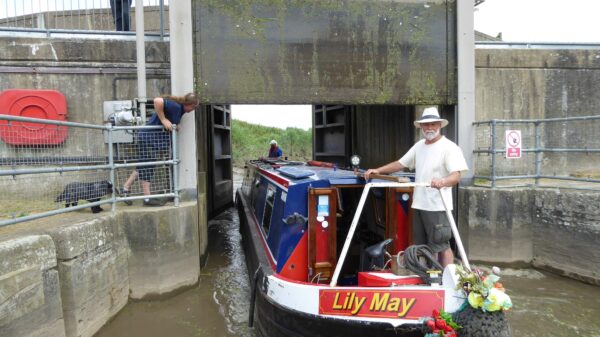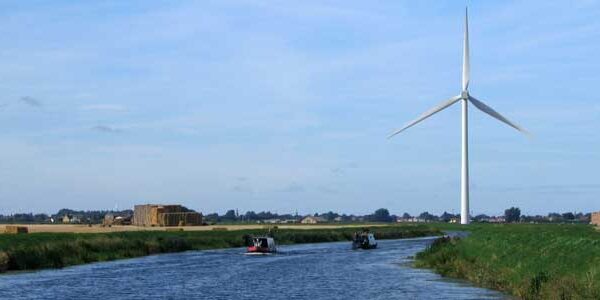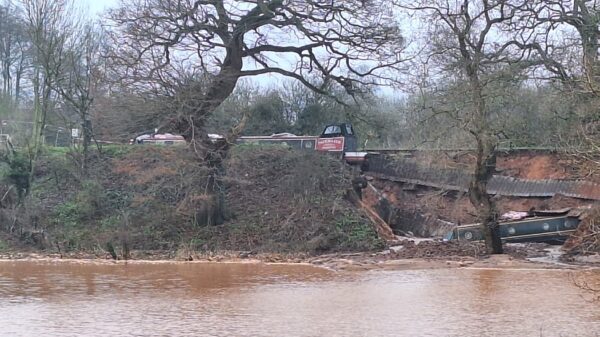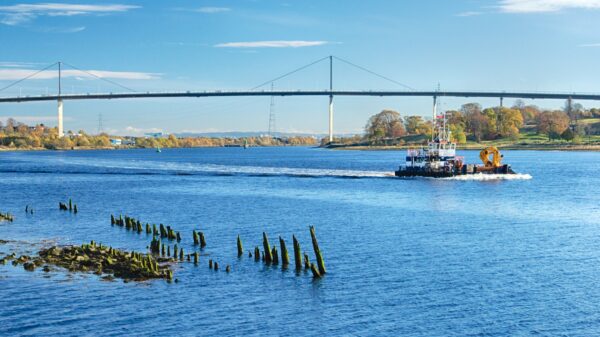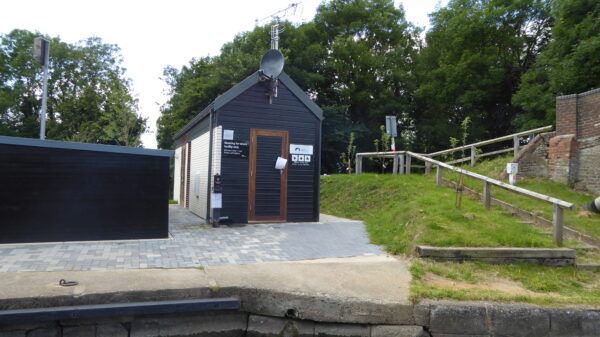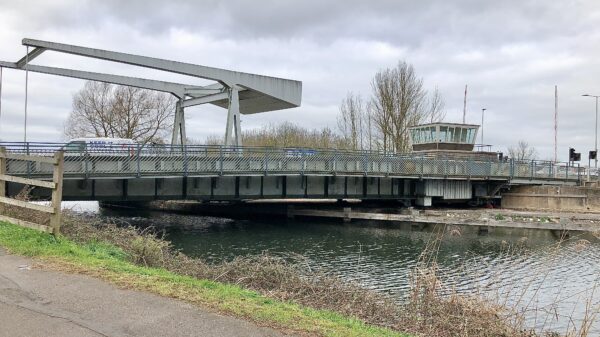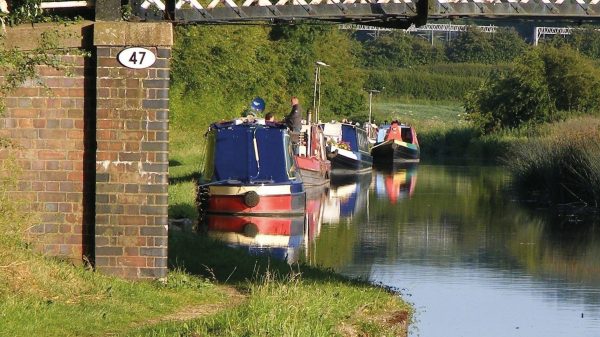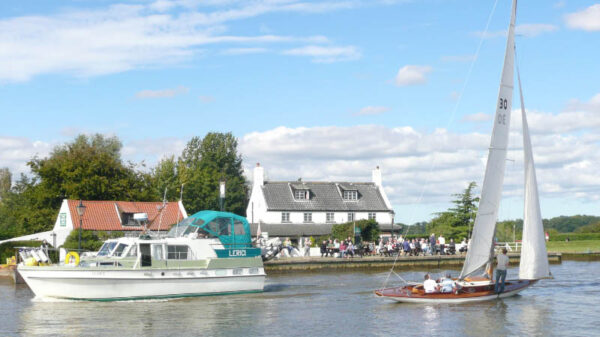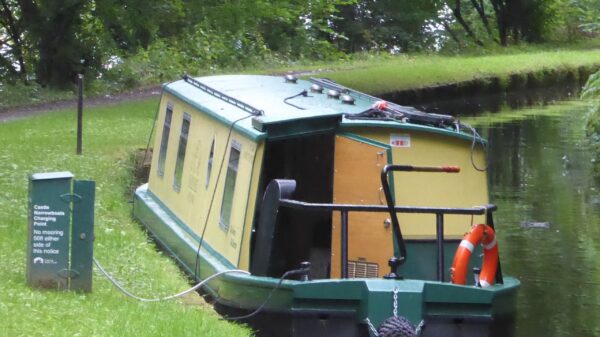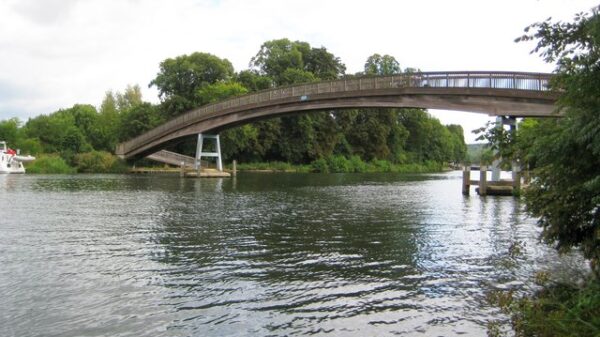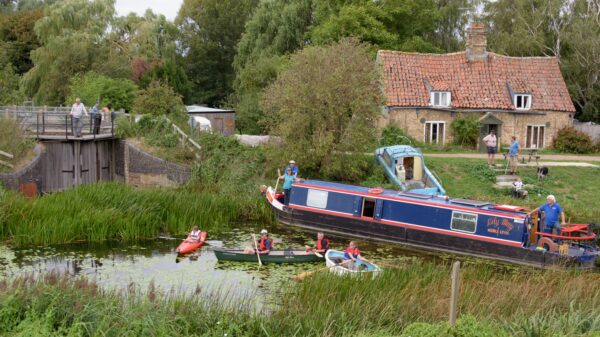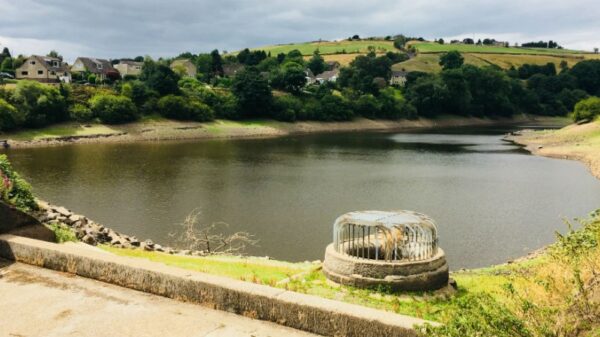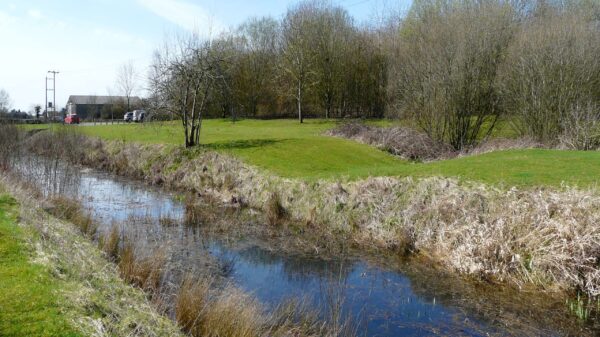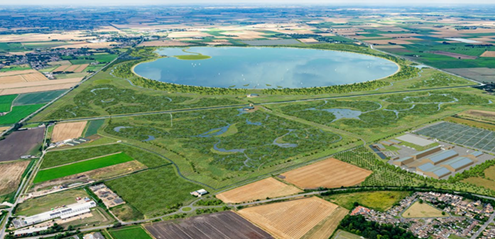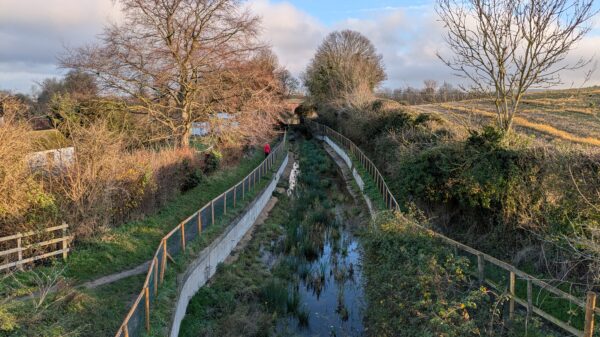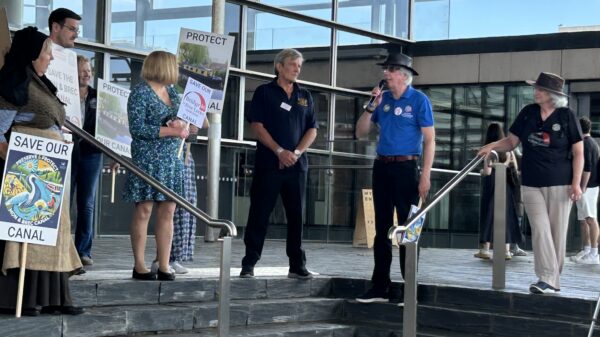| Thinking of embracing a life afloat but not sure what to expect? For most people it will mean a huge lifestyle change and isn’t a decision to be taken lightly. Alison Smedley, chair of IWA North Staffs and South Cheshire Branch, spent seven years living on a boat. Find out about some of the highs and lows of her experience living aboard a narrowboat. |
“Isn’t it Cold in Winter?” people used to regularly ask me, during the 7 years I spent living afloat. “No”, I used to reply “It’s nice and snug with the stove going”. That wasn’t the reality, of course, I used to gloss over the mornings when I would wake up shivering under the duvet with ice on the inside of the windows because the stove had gone out during the night, or because I’d arrived home too late the night before to re-light it.
People often have an image of life afloat as being idyllic and peaceful. It’s nothing of the sort, in my experience. It can be fun and exciting, but it can be cold, hard work and lonely too.
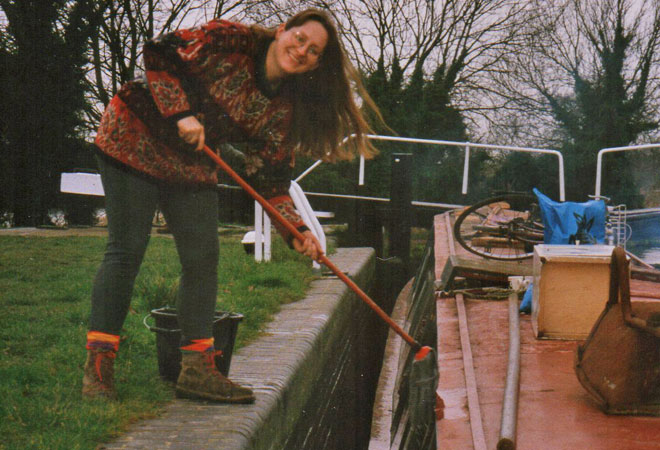
Photo: Mopping the decks
During much of my 7 years living on a narrow boat I travelled around a lot, and religiously moved the boat every two weeks. For a lot of this time I was working as a secretarial “temp”, so was able to move from town to town and pick up work anywhere.
As well as wanting to comply with the rules, moving every 2 weeks was necessary for practical reasons, being an opportunity to fill the water tank and visit a boatyard to get the toilet pumped out and occasionally fill up with diesel and get gas bottles replaced. I would often plan this for a weekend and invite friends over for a day trip or a weekend on the boat, but the rest of the time I had to do it on my own, which could be challenging and wasn’t quite so much fun in the rain.
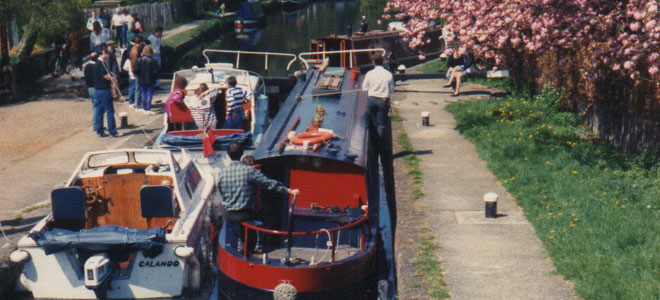
Photo: Moving from one place to another can often make for a lovely day out with friends
One winter the canal froze for weeks and I couldn’t move the boat anywhere. I managed to obtain sacks of coal and a new gas cylinder by dragging then along the towpath through the snow from the nearest boatyard, but the available water in the water tank got less and less as it froze in layers above the reducing amount that was still liquid.
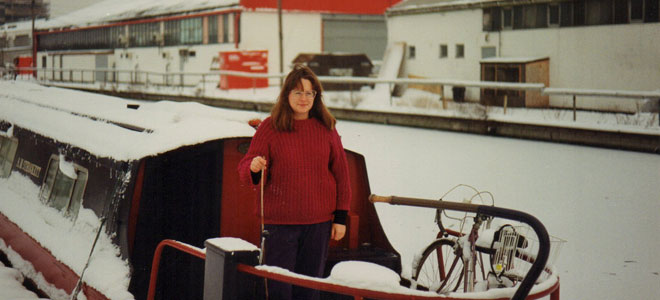
Photo: Snowed in at Uxbridge
One peculiarity of living on a boat is that unlike bricks and mortar it doesn’t necessarily stay where you put it! I once woke up in the middle of the night to the sound of rushing water to discover the boat had come adrift (strong winds had pulled out the mooring pins) and the boat had drifted some distance along the canal into the lower entrance of a lock, with excess water pouring over the bottom gates. Quite a shock when I opened the front doors to a cascade of water! Another time the boat was purposefully set adrift from the mooring rings I had tied to, and I woke up to find the boat on the other side of the canal along with 2 or 3 other boats that had been untied.
As a female in my early twenties, my personal safety was something that other people, particularly my parents, used to worry about – walking home along a dark towpath late after a night out didn’t particularly worry me at the time, but looking back I realise that I was lucky not to have had any serious mishaps. One time the boat was broken into and a camera and jewellery stolen – fortunately I wasn’t on board at the time.
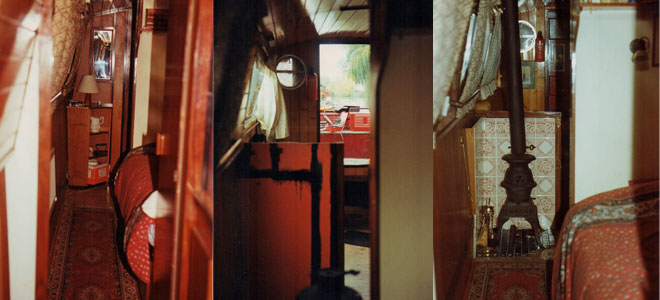
Photo: You may decide to make modifications to your boat, these photos show a corner cupboard being replaced with a solid fuel stove.
Although I am a fairly practical person, I don’t think I would have survived at all without a circle of friends who used to come along and help me sort out flat batteries and an engine that wouldn’t start, or help installing a wood burning stove, or helping out in dry dock. Of course often these events turned into social occasions, and I like to think that I hosted some pretty good parties during those seven years!
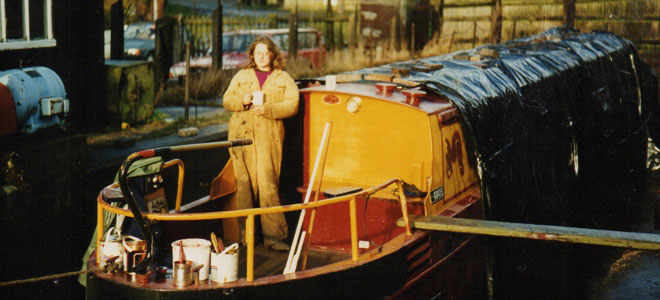
Photo: First dry docking of many – Tardebigge Dry Dock
When people heard that I lived on a boat, they would often ask me about it as a cheaper way of living. My response was always that you should want to live on a boat for the right reasons, because you are interested in boating and the waterways, and not just because it might seem like a cheaper option than a flat or a house.
In my experience, barely a week would go by without some issue to deal with – a storm bringing a tree down on the boat, the engine not starting, going to moor up after moving one weekend to discover I’d left the mooring pins behind ten miles away, but the sense of satisfaction of owning and living on my own boat was something that for me made it all worthwhile.
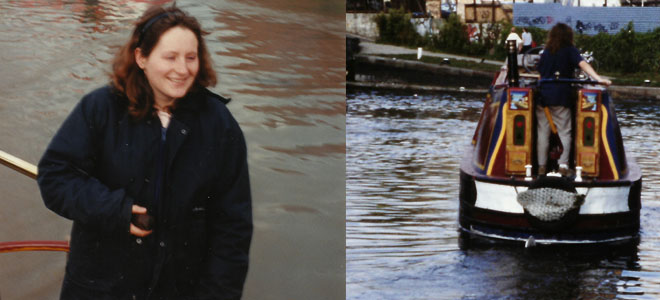
Photo: The pleasure of steering your own boat down the cut
Living on a boat might seem cheap compared to living in a house, but instead of gas, water and electricity bills, and repairs to plumbing, roofs, boilers and the like, on a boat you have diesel and gas to purchase, toilet contents to get rid of (whether that is emptying it yourself or paying for a pump out), repairs and regular maintenance to the hull and superstructure, and maintenance, repair or replacement of equipment such as engines, generators, water pumps, bilge pumps, shower pumps, inverters ( there is an endless list of equipment that people can have on their boats).
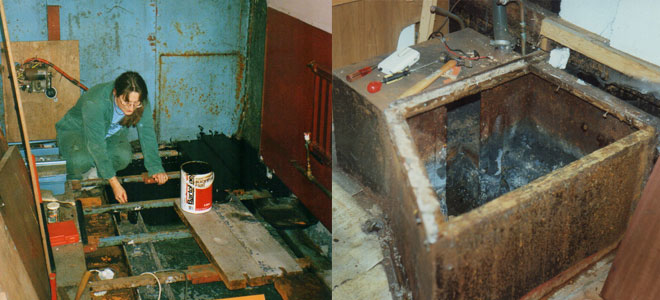
| Photo: One day you may decide a complete re-fit-out is needed! | Photo: Alison decided to take out the pump out tank and replace it with a porta potti – not a pleasant job! |
Many people who live afloat these days rely heavily on the various trading boats who do a sterling service plying up and down our waterways selling solid fuel, gas and even offering toilet pump outs. Although even these boaters have to fend for themselves if the canal ices over for weeks and the service boats can’t get to them.
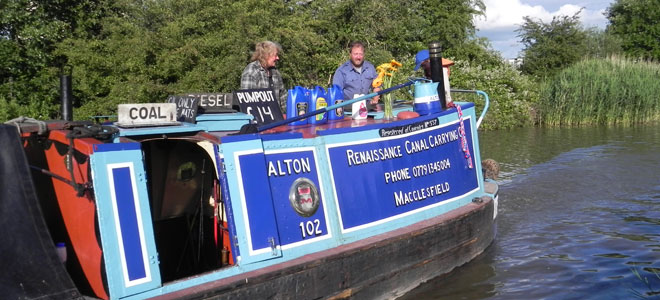
Photo: Some parts of the waterway system have a trading boat offering solid fuel, diesel, gas and even pump-outs
There are many things to consider when contemplating a life afloat:
- Licence – you will need a licence for the navigation authority for the river or canal that you plan to be based on, and visitor licences for any waterways in different navigation authority ownership that you may wish to visit.
- Mooring – if you want to live in one place, so you can attend college or get to your place of work, for example, and not be continually moving your home around, you need to find a mooring (preferably before you take the plunge and buy a boat). Suitable moorings in popular areas such as London are scarce and can be very expensive.
- Alternatively, on Canal & River Trust waterways you can declare yourself as ‘continuously cruising’, which means you don’t have to pay for a mooring, but you will need to move your boat at least every 14 days (sooner if moored at a visitor mooring which specifies a shorter period). And this doesn’t just mean moving round the bend to the next road access point. If you have a job based in one place, or other local commitments such as school for your children, this isn’t a practical option, and you should look for a permanent mooring.
- Insurance – in order to obtain a licence you will need to take out at least third party insurance. However, if all your worldly goods are on board you may wish to take out full insurance on the contents too. Boat fires and boat sinkings are both things that can and do happen. Boats also tend to be less secure than houses and boaters often find things stolen from their roofs or decks even if the cabin hasn’t been broken into. If the boat is more than 20 years old then most insurance companies will insist on regular hull surveys (out of the water) – a considerable expense.
- Are you practical? Can you fix the engine (or bilge pump, water pump, etc) when it breaks down, or will that be an additional expense?
- Can you actually steer and manoeuvre the size of vessel you are contemplating? Why not book yourself on an RYA Helmsman course to learn some useful skills.
- Boat safety – boat fires and carbon monoxide poisoning occur on board boats for various reasons – you need to be aware of your own safety and not block air vents or escape routes. Every 4 years you will need to pay for a Boat Safety Examination – and heed the advice of the examiner in keeping your boat safe for you and other users of the waterway. Boat fires happen more often than you might think, and could happen on a boat moored next to you, however safe your own boat is.
- Water – filling up the water tank is something that you will have to do more frequently than you might think if you are living aboard, and it could be some hours boating to the nearest water point. You’ll very quickly become conscious of the amount of water you use washing up or having a shower.
- Heating – How is the boat heated – it’s a good idea to have two sources of heat so that one can be a backup in the event of running out of fuel or something breaking down. Diesel and gas can be used for heating systems, and most boats also have a solid fuel stoves which can burn wood as well as solid fuel (smokeless fuel is not required by law even in a smokeless zone but is a good idea to avoid annoying local residents). You will have to think about how you will transport solid fuel, gas and diesel if not moored at a boatyard which sells them.
- Toilet – What type of toilet does the boat have, and is it the best type for you? A pump out tank needs emptying less often but can only be emptied at certain places, with a cost involved. A “cassette” style toilet has a small portable tank that you can empty yourself, at “sanitary stations” provided by the navigation authority, at no cost, but will need emptying more often. It’s a smelly job and not for the faint hearted! It also has the benefit of being more portable so if you can’t get the boat itself to a disposal point you can still take a full cassette there.
- Internet access and mobile phone signal are things everyone takes for granted these days, but you will need to think about how these are going to work for you on a boat, particularly bearing in mind a steel cabin’s tendency to affect signal. There are various solutions available and you should research them if technology of this type is important to you.
Some additional things to consider if going down the “continuous cruiser” route:
- Planning ahead – You will have to think about where you are going to move your boat to every time you move, and plan your progressive journey ahead. Some parts of the country, notably London and the Bath/Bristol area, are getting extremely overcrowded, making it very difficult to find a mooring when you do move.
- Transport – If you own a car you will have to work out where you will keep it, and how you will retrieve it each time you move (a bicycle comes in very handy here). You may also find that you will be using public transport a lot more – another added expense.
- Electricity – These days electricity is needed for everything from lighting the boat to running the pumps so you can have a shower, and for charging your mobile phone or tablet. Where is your electricity going to come from? You will need to either run your engine or a generator (both noisy) in order to keep your boat batteries topped up. Wind generators and solar panels can be useful additions to top the battery up, but both rely on certain weather conditions so cannot be relied upon solely. Finding a mooring which comes with an electricity supply is the best solution to this problem, if you think you are going to spend most of your time moored up and not travelling around the system.
- Being a good neighbour – Do be considerate to your neighbours on land or water. Excessively smoking chimneys, generators or engines running for long periods and belongings spread across the towpath will not endear you to the local community.
- Groceries – Think of all the food (and drink!) that you consume, and then bear in mind that you are more than likely to have to carry it some distance from where you bought it.
- Winter months – What will things be like in the winter? Make sure you have made plans for how you are going to cope. Not all areas benefit from the services of a coal boat regularly plying up and down selling coal, diesel and offering pump outs. A spare portable type toilet (or extra cassette) in case you can’t get your tank pumped out, is a good idea, but bear in mind you will have to carry it along the towpath (although a wheelbarrow or trolley can come in handy here).
- Personal security – Your personal security getting to and from the boat – will you feel safe walking along unfamiliar towpaths in the dark as you move around from place to place? Or would you be better off with a permanent mooring in a secure boatyard or mooring site?
- Health services – You will need to consider what you are going to do if you need medical attention – while getting access to GP surgeries, dentists and hospital appointments is possible, it will always be harder if you are just passing through an area, and may hold up your planned schedule while you have to wait to be seen or for follow up appointments.
- Voting – You can register to vote even if you do not have a permanent mooring or home address, by registering a “declaration of local connection”. This can be the place you were last registered, a boatyard you have used for maintenance, or somewhere you spend a lot of time.
- Emergencies – When moored up in the middle of anywhere its always a good idea to know your exact location so that you can advise the emergency services should they be required due to an injury, illness, accident or fire.
- What happens when you want to move back to the land – Living on a boat should not be seen as a first step onto the housing ladder. Unlike property, even well built and maintained boats will not appreciate in value and are likely to lose value each year.
- Over-staying – If you are tempted to ignore the rules and over-stay in one place, you will find yourself extremely unpopular with fellow boaters, which is a pity as the camaraderie between boaters is one of the special things about living afloat. More importantly, Canal & River Trust can and will take action against offenders and you may ultimately end up in court and/or lose your boat.
Many of these problems are overcome if you have a permanent mooring, or if you are genuinely travelling around the waterways network. If you are continuously cruising your electricity will be generated as you boat along, and you will frequently pass shops, water points and boatyards. Some Navigation Authorities such as Canal & River Trust offer winter mooring permits to boats that are otherwise “continuously cruising”, which mean that you can base yourself in one place for the colder months.
Living aboard can be a hugely enjoyable and rewarding experience for those who have a passion for boating and the waterways environment – but it’s a labour of love. It’s not an easy or particularly cheap option, so it’s important to seriously consider all the implications before making a decision.
To find out more, do look at the living afloat section of IWA’s website
Alternatively you can consult the Residential Boat Owners Association website
Or see the advice given to people contemplating continuous cruising on the Canal & River Trust website (PDF).

